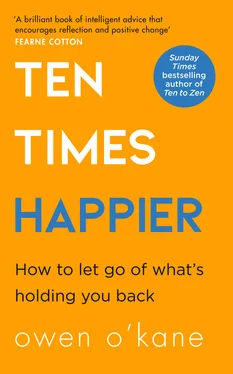NEGATIVE OR TRAUMATIC EXPERIENCES
These experiences are past events you had no control over, which led to damage and hurt in your present life. Only you will know what these events are. As a general rule they tend to feature regularly in your thoughts, impact on your happiness, deplete your self-worth and leave you with a prevailing sense of powerlessness. The most common events from the past I hear people discuss are:
• Abuse of all kinds (emotional, physical, sexual)
• Violence
• Poverty
• Deprivation
• Family conflict
• Addictions
• Bullying
• Cultural conflict
• Hardship.
The list is endless and again I would encourage you for now to simply make a note of any negative or traumatic experiences you would like to start letting go of . In summary, if the event still replays regularly in your mind, creates distress, and impacts on your happiness then you haven’t let it go. In therapy we would say the event hasn’t been processed.

HOW YOU CAN MOVE FORWARD
UNHELPFUL RULES AND BELIEFS
Earlier in the chapter you will have listed some of your unhelpful rules or beliefs learnt from past experiences. I want to keep this really simple by asking you to go back to your rules and for each of them ask:
1. Do these rules work for me?
2. Are they achievable all the time?
If not, then it’s time to re-evaluate and make them more flexible. Remember, as I mentioned earlier, not all rules or beliefs are unhelpful but if they lack flexibility, therein lies the problem.
I worked with a client recently who had very strong rules and beliefs about being a ‘good person’. He did laugh in a therapy session one day when I highlighted that Mother Teresa would have struggled to live with some of his rules! He worked as a fulltime carer, volunteered in a soup kitchen five days a week and sang in the church choir.
His belief was that he should always help people and put others first. If he didn’t, he then saw himself as a bad person. It won’t surprise you that he arrived in therapy exhausted, frustrated and unfulfilled. He was operating from a belief that to be a good person he had to do good all the time. It wasn’t sustainable. Ultimately, he had to learn that he was a good enough person whether or not he engaged in all these activities.
As you look at your rules from earlier I would encourage you now to consider introducing some flexibility to some of the more rigid rules you might have. For example, the rule, I must be perfect , could now become, I don’t need to be perfect all the time . Likewise, I must never disappoint people , could now become, sometimes it’s OK to say no . If it’s helpful for you, write your new flexible rules down in your journal so you can remind yourself of them when needed.
Be mindful that this work takes time and patience. You are rewiring your brain to respond more flexibly. Sometimes you will fail and want to return to the safety of what you are familiar with but stay focussed on the new freedom and flexibility this will eventually bring.
You are now giving yourself the opportunity to rewrite the rules from your past, and make the new rules work for you. You are no longer living by the unhelpful inherited rules that simply don’t work for you.
It is important to be mindful that you can respect the inherited rules of your past but you don’t have to agree with them.
Living your life by rules that are not comfortable for you is tough. It’s almost like walking through life in a pair of shoes that are the wrong size. It will be uncomfortable, restrictive and painful at times. You now have the option of choosing a more comfortable fit. Take it from me, I’ve spent many years wearing size seven hobnail boots, when a pair of size nine loafers would have been a much better fit.
NEGATIVE OR TRAUMATIC EXPERIENCES
Some negative or traumatic past experiences will get in the way of your life if they are not dealt with. I am confident some of what I offer you here will be immensely helpful and allow you to move forward. It is worth mentioning some long-standing deep issues from the past may need discussion with a professional, simply to help you process the events and leave them in the past. Not everyone needs therapy, but some people do. There is no right or wrong here. Simply be aware that there are options for how you decide to manage this section of our work together. If self-help work isn’t enough, always seek professional guidance.
The approach I use to help process a difficult experience or event from the past encourages you to ask yourself five key questions about that event in the here and now:
1. Ruminating. Is there any benefit to holding on to this hurt from the past?
2. Self-judgement.Was it your fault this painful event or circumstance took place?
3. Expectations of self. At the time of the event can you accept it would have been difficult to have the perfect mindset to deal with it?
4. Self-blaming.Did you wish for this event or experience, which ultimately had a negative impact, to happen?
5. Mindful awareness.Can you accept the actual event is in the past and you are now safe?
In the vast majority of cases the answer to all or some of these questions is likely to be no. But no matter how many you answer no to, the main aim is learning to stop with any self-judgement or self-blame, which can often accompany these experiences.
What I know from the hundreds of clients I have treated over the years is that holding on to the past causes one thing only: pain. My interest is in easing that pain and I believe the solution lies in the five alternative options below which link to the questions I have just asked. For example, if harsh self-judgement is one of your patterns, then you have the option to drop this and replace it with something more helpful. Below are some of the alternatives I propose you take on board. You will know what resonates with you.
I suggest you reflect on a past event that troubles you and work through each of the five points below with the event in mind. It will help you find a new perspective.
FIVE ALTERNATIVE OPTIONS FOR MANAGING THE PAST
1. You don’t need to replay this event over and over again. That achieves nothing other than keeping you stuck in the past. If you are unable to stop replaying it, this is when professional support is important.
2. Ease up with the self-judgement. Self-blaming or punishment is never helpful.
3. Remember whatever happened, it’s over now and you have survived.
4. Taking care of yourself is of utmost importance. Do this with compassion.
5. None of what has happened can be changed now. You deserve a happier future.

HOW THIS WILL CONTRIBUTE TO A HAPPIER LIFE
Learning to manage the past will liberate you and allow you to experience a new sense of empowerment. When I talk about ‘managing the past’, I am encouraging you to use these techniques that will help you file away memories that are no longer needed in the here and now. You will no longer be controlled by unhelpful or painful aspects of your past. Instead the past can now become a teacher, a tool for wisdom.
THE EVIDENCE AND RESEARCH
Читать дальше













